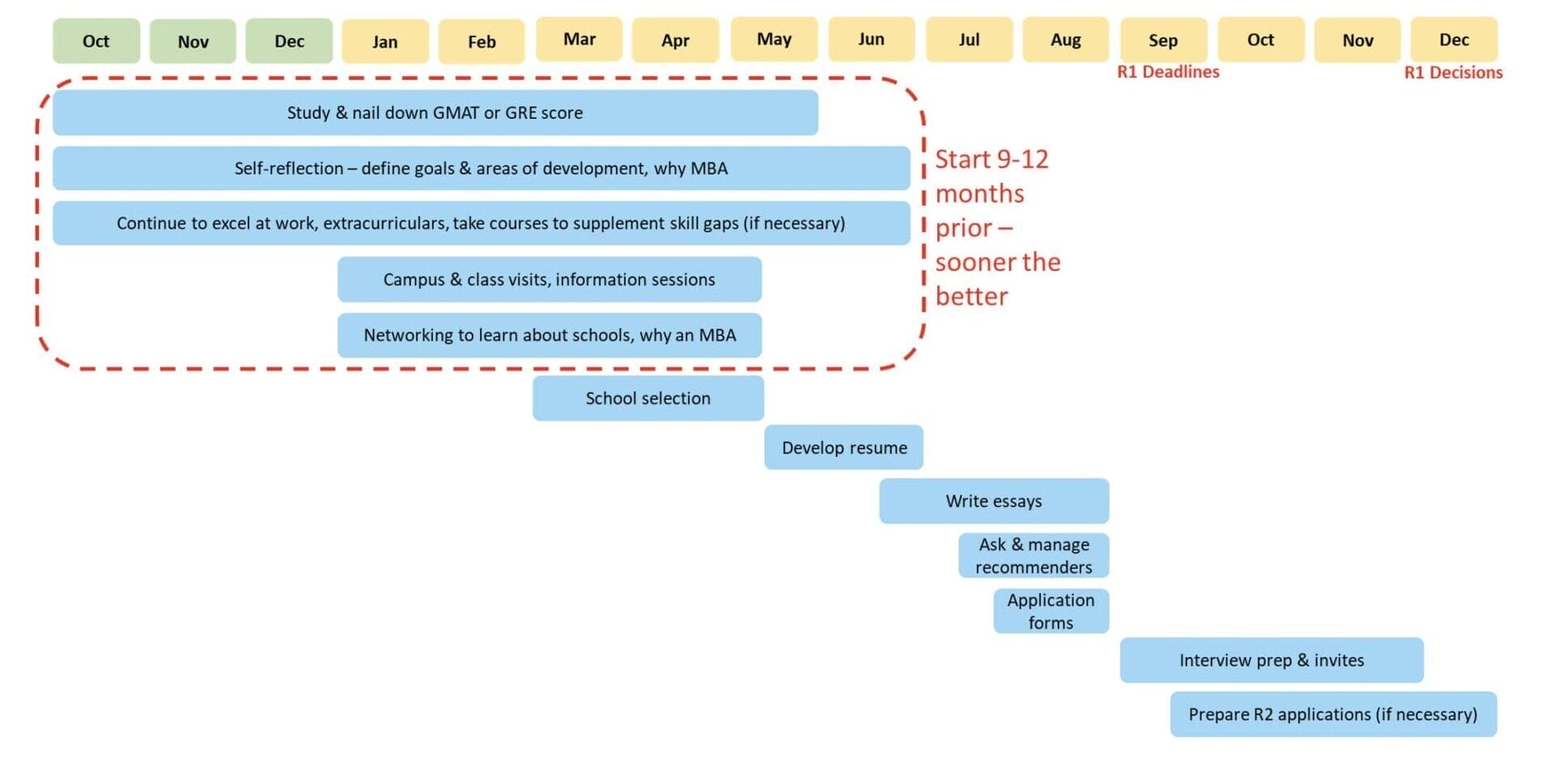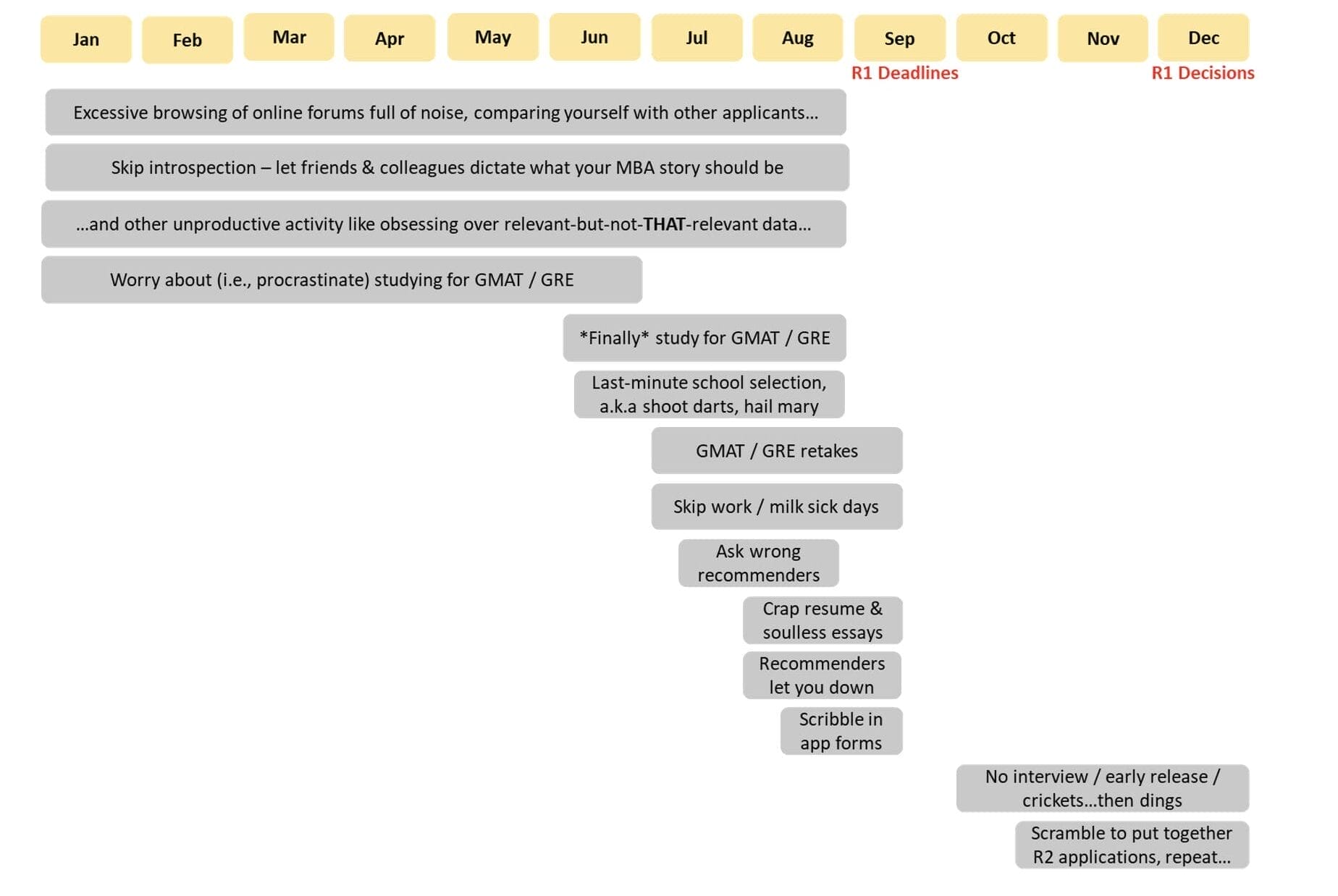The following is a guest post by MBA Admissions Consultant, Masaki:
The Smart MBA Application Timeline

The Unfortunate (all-too-common) MBA Application Timeline

There is a lot more to putting together a winning MBA application than just writing essays. In fact, many applicants fail to recognize that there is so much groundwork involved before you even put pen to paper.
Your MBA Application Roadmap will look different depending upon which programs (U.S. vs. Europe, full-time vs. part-time vs. EMBA), which round, and your personal situation. The above are just sample timelines to illustrate common application scenarios for U.S.-based full-time programs. The “smart” application timeline may be longer if you know you are not the best test-taker or need to hit certain milestones at work to build your resume.
Here are the most common items that screw up your MBA application timeline (in no particular order):
Preparing for the GMAT or GRE
The smart way: Get started 9 – 12 months in advance of deadlines (or sooner!)
Once you decide to apply, your first order of business is to scan through the GRE and GMAT to determine which one you’ll do better in. As a college grad who has taken standardized tests before, you have a good sense of how you will do. You figure out your optimal study method and timeline, study steadily, and nail down your target score at least a few months in advance of submission deadlines. Now that the test is out of the way, you can invest the last few months into writing your essays, managing your recommenders, dotting the i’s and crossing the t’s on the rest of your application.
The unfortunate (all-too-common) way: Start studying a few months in advance or less
Procrastinate, procrastinate, procrastinate. You finally start studying two to three months before submission deadlines, while also scrambling to put together your essays. Try as you may to get everything done at once, your test score falls short of your own expectations, and you end up submitting your sub-optimal score or postponing your application to the next round or admissions season altogether.
For most, studying for tests is not fun. But if you have time to waste going on online forums to ask strangers whether you should take the GRE or GMAT, what your target score should be, when you should start studying…just get started on it already. Everybody is different. The only way you will know which test works better for you is to look through the exams yourself and take the practice tests. And the only way you will know what your target score should be is by doing an honest self-assessment of your knack for test-taking, the time you realistically have for studying, and what study methods are available to you based on your budget.
Also consider the average score as disclosed in the class profile of your target schools, which is a good starting benchmark. The formulaic guidance thrown around among applicants and industry providers should be taken for what it is – formulaic guidance, not universal fact. “Because you are in X demo, Y industry, Z function, have a 3.8 GPA from Ivy League and a non-traditional or even unique backstory, you only need this or that score.” There is more nuance to it than this. To reduce (not eliminate) your chances of getting dinged because of your test score, I say always aim high and higher – within the bounds of what is realistically achievable for you.
The necessary study time for the GRE or GMAT will depend on a combination of your fundamentals as well as the study time you can realistically squeeze out while juggling everything else in your life including your full-time job. You are the only one who knows your personal situation, so why should you listen to this guy or that girl who just happened to need only a few weeks of study to nail down a 705 on the GMAT? Stop asking and talking about it, and just do it already. And if you know you’re not the best test-taker, be extra conscientious about setting milestones, reassessing, and recalibrating as necessary. You may need to pivot on your study method or study schedule more than once to achieve your target score.
Self-Reflection and the MBA Application Essays
The smart way: Early (ideally lifelong) introspection that facilitates easy, breezy essay writing
9-12 months in advance of deadlines, you start reviewing previous years’ essay questions to get a sense of the kind of things you are required to articulate about yourself. You make it a daily habit of taking a long, hard look at your strengths and weaknesses, what your authentic goals are, what additional experiences and resources you need to get to wherever you want to get to, and how an MBA education may fit in your personal and professional trajectory.
Better yet, you are a lifelong philosopher who understands your soul. You do not rely on external validation to figure out what is most important to you, form your own view of the world, and your relation to it. You can articulate a sense of direction that is in congruence with who you are and what you are about and can draw a practical and feasible roadmap to progress in that direction. This is not a promise that the career goal you describe in your essays will indeed be the career that you end up pursuing post-MBA. You certainly are not expected to have EVERYTHING mapped out. But having an executable plan serves as strong evidence to schools that you have done the prerequisite self-analysis that will empower you to make the most of the time and resources an MBA program can offer you.
Yes, there is some rewriting involved to get the structure, choice of examples and details, and word choice just right. But overall, it is not that difficult for you to answer the essay prompt, because articulating your authentic self is right up your alley. After all, this is what you have trained your brain to do. You know what you want to say, and it spills out naturally on paper. You’re not concerned about what the schools want to hear, nor what other applicants are writing in their essays. And because you have visited campuses and may even know alumni and current students whose work you admire, you can articulate in a personalized way why you are a fit for each program.
The unfortunate (all-too-common) way: Start writing one or two months before deadlines (with zero self-reflection, while also scrambling to nail down your test score)
You are applying to business school because it is just another “check-off-the-box” item for your resume. Or maybe you hate your current job, but your job search is not going well so you figure an MBA sounds like a nice exit out of your current misery. In any case, you have only a month or two to go until submission deadlines, so you put pen to paper but hours, days, or weeks later, you’re still staring at a blank paper or frantically browsing the internet to search for “essays that got into HBS / GSB / Wharton.” You aggregate and synthesize anything and everything that sounds like what business schools would want to hear, peppering it with smart-sounding vocabulary and famous people’s quotes, and topping it off with a hefty dose of virtue-signaling. There is no detailing of what exactly you mean by “financial literacy for youth with X” or “fighting climate change with clean energy Y,” how, in practical terms, you will tackle whichever big business or social issue of our times, and why, of all people, you would be the one to do it. Moreover, there is no acknowledgment that you may not be all that perfect and may have stuff to work on before achieving greatness – which begs the question of why you even need to go to business school if you already know it all. Your essays do not jive with your current and past as presented in your resume. In fact, your essays, resume, application form, and recommendation letters all seem to be talking about different people – collectively painting a schizophrenic persona. Because you don’t know anything about the programs other than where they place on rankings, you copy text from the schools’ marketing brochures and paste it into your essays to explain why that school.
You feel satisfied with your essays void of introspection and hit submit – sending them into a cesspool of equally flowery essays full of BS written by other applicants who took the same approach as you, waiting to be skimmed through and forgotten – quickly.
Recommenders for the Business School Application
The smart way:
Months in advance, you start thinking about potential recommenders, including backups in case your top choices cannot do it. Your recommenders should ideally include your current supervisor. However the schools recognize that some applicants cannot tell their employers about their MBA applications, or else there may be other reasons why you cannot expect your current supervisor to write an enthusiastic letter for you. If that is the case, your choice of recommenders would be managers or mentors who are senior to you, and with whom you have worked directly. Whomever you ask knows your work inside and out, and can articulate your contributions in detailed terms, peppering the letter with concrete examples. You strike the world-famous CIO off your potential recommender list, knowing that it is you whom the schools are evaluating, and not the recommender. You understand that this world-famous CIO cannot possibly write a convincing letter because he doesn’t know you well. You stay on top of your recommenders’ work and holiday schedules so that you are not caught off guard when they are unavailable. You raise the topic to your top picks well in advance, to gauge their response. A reaction that is anything less than enthusiastic is a bad sign, so you want to be prepared to ask other potential recommenders, if necessary.
Better yet, the minute you decide to apply, you work even harder to “condition” your recommenders – especially your current supervisor. If the work environment allows for it (those who are not subject to rigid job descriptions/promotion timelines) you identify and create opportunities that will enhance your leadership profile, and advocate for yourself to convince the boss that you are the one to take these on. The more your boss witnesses the milestones you keep hitting, the more amazing stuff she will have to say in her letter. Ditto for your resume – the more you progress, the more impressive bullets you will have.
The unfortunate (all-too-common) way:
You are supremely confident that the two recommenders you have in mind hold you in high regard. Because…why wouldn’t they?! They are also famous and well-respected in the industry, and so you figure they must be phenomenal letter writers. One of those recommenders has never even seen your work up front and close, but whatever – he is great, and you’re great, and that’s all that matters! You (wrongly) believe recommendation letters are just a minor piece of the application, so do not raise the topic until right before submission deadlines. Surprise, recommender A is less than enthusiastic, muttering something about a heavy workload and family obligations. But you beg him to do this for you and he acquiesces albeit reluctantly. Recommender B, on the other hand, enthusiastically agrees to write for you, but two days before submission deadlines, he asks you to write the letters yourself and says he can just sign off. Because you have not thought about, let alone asked, backup recommenders, you hastily write letters that do not add any additional insight to the rest of your application. Try as you may, you cannot convincingly switch up your language and the letters carry an uncanny resemblance to the lingo in your essays. So you ask your friends to replace words and phrases in your desperate attempt to make the letters “authentic.”
The result is (predictably) poorly written letters void of examples and details to back up assertions that may also come across as suspect as to who wrote them. One or both recommenders may miss submission deadlines.
So folks, to increase your odds, start early! Don’t follow the unfortunate, all-too-common scenario because that is the fastest way to securing a ding.
Masaki is an MBA / Master’s Admissions Consultant & Career Coach. A Wharton MBA herself, she brings a blend of business experience, admissions know-how, and storytelling to help applicants identify their goals and craft their tell-worthy personal stories. Her clients have won admission to the most competitive graduate programs in the world, including Harvard, Penn/Wharton, MIT, Booth, Northwestern/Kellogg, Columbia, Haas, Yale, INSEAD, LBS, and more. In addition to her signature, personalized client attention, she has also gained notoriety for keeping it real, telling clients what they need to hear (instead of what they want to hear) to maximize their chances of admission.

